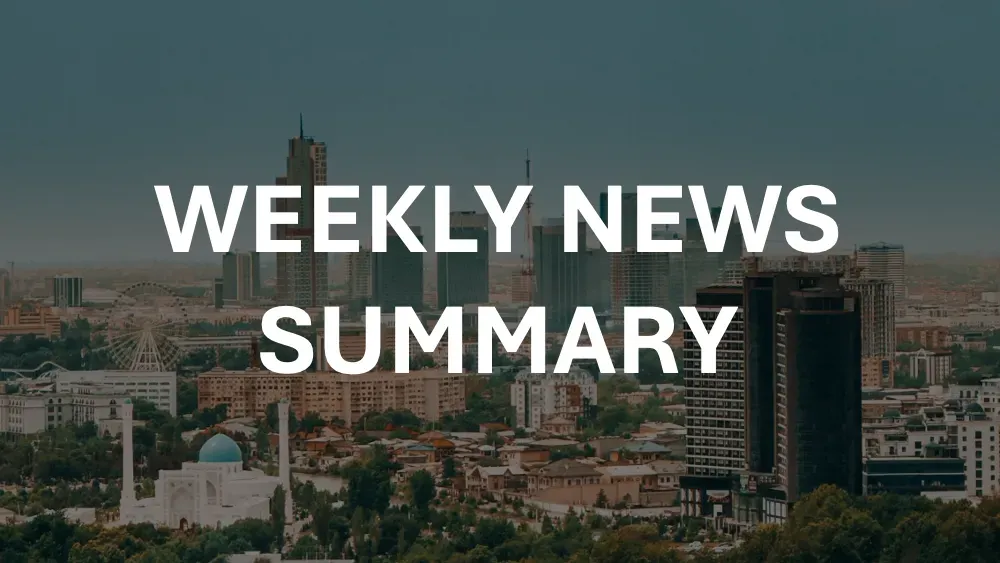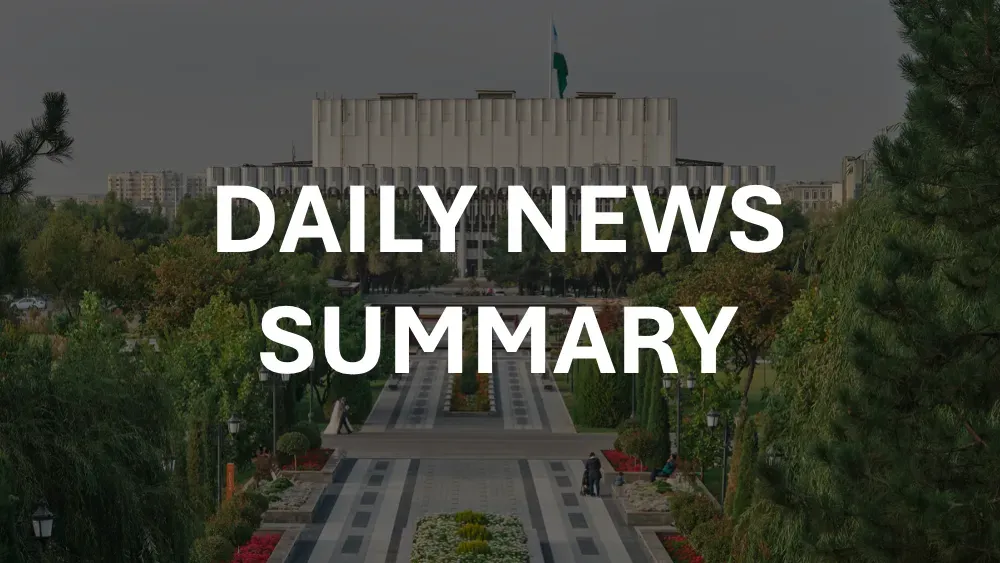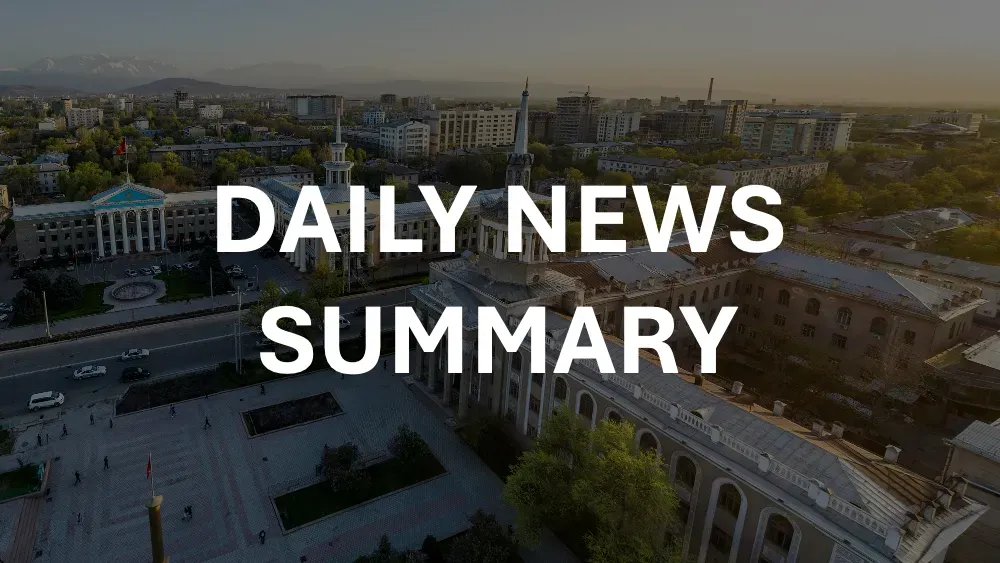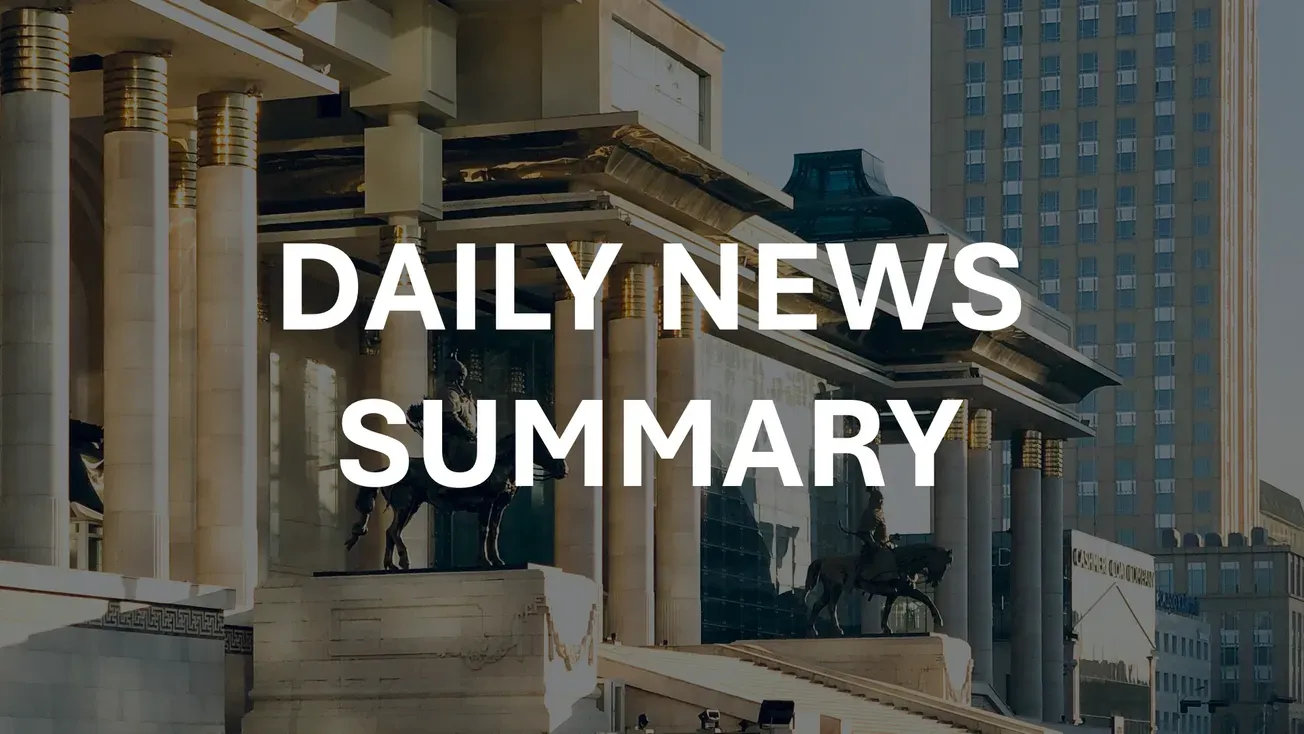This weekly digest showcases just 10 stories. Daily subscribers receive comprehensive intelligence briefs with 40 of the top stories organized by category. Don't miss the stories that matter.
Subscribe to Daily →
October 24, 2025 to October 30, 2025
This week's top 10 stories from Uzbekistan, selected from our daily intelligence briefs.
1. EU and Tashkent Sign Enhanced Partnership Deal, Setting Broader Agenda for Trade, Minerals and Connectivity
On 24 October 2025 Uzbekistan and the European Union signed an Enhanced Partnership and Cooperation Agreement (EPCA) in Brussels, upgrading the 1999 framework into a comprehensive 356-article pact with 14 annexes to deepen cooperation across trade, investment, energy, security, digitalization and education. The visit by President Shavkat Mirziyoyev — which included meetings with European Council President António Costa, Commission President Ursula von der Leyen and Belgium’s King Philippe — also concluded bilateral WTO market-access negotiations with the EU (one of 31 of 34 members now agreed), locking in tariff ceilings and services commitments as Tashkent targets formal WTO accession at the March 2026 ministerial.
The EPCA signals a strategic EU push into Central Asia beyond Kazakhstan: Brussels aims to leverage Global Gateway funding and a newly agreed €10+ billion project pipeline (adding to an approximate €50 billion portfolio) to boost critical minerals exploration and processing, grid-scale renewables, resilient Trans‑Caspian transport links, digital and human‑capital development. Obstacles flagged by analysts include distance, Russian sanctions spillovers and divergent human‑rights approaches, but the deal formalizes mechanisms for investor protection, customs and technical-barrier reduction and visa facilitation talks, and underpins growing EU trade (about $6.5 billion in 2024) and FDI ties as part of Uzbekistan’s multi‑vector reform strategy.
Local Coverage: kun.uz, gazeta.uz, anhor.uz, qalampir.uz, uza.uz, uzdaily.uz
From daily briefs: 2025-10-24, 2025-10-25, 2025-10-26, 2025-10-30
2. Credit Rating Target Raised to BBB+ by 2030 with 29 SOE Privatizations and Dual Listings Planned
Uzbekistan plans to secure an investment-grade sovereign rating of BBB+ by 2030 and privatize 29 major state-owned enterprises by 2028, Deputy Prime Minister and Finance Minister Jamshid Qo‘chqorov said at a Franklin Templeton Investor Day. The government — currently rated BB+ by S&P after a June 2025 upgrade from BB— is drafting a 2026–2030 privatization strategy with the Asian Development Bank and World Bank, expected to be approved by year-end. Flagship assets named for sale include UzAuto Motors, UMS, O‘zmetkombinat and Navoiyazot; 12 large companies will pursue IPOs/SPOs on domestic and international exchanges over the next three years.
To attract institutional capital and deepen market liquidity, the National Investment Fund is planning dual listings in Tashkent and London with up to 75% free float for some offerings. Corporate-governance reforms are also being accelerated: 16 large state firms already have international credit ratings (mostly BB), several have ESG scores, boards are moving toward 25% independent directors, and mandatory IFRS reporting will shift to semiannual disclosures — measures officials present as critical to achieving the 2030 BBB+ target.
Local Coverage: uzdaily.uz, gazeta.uz
From daily briefs: 2025-10-24, 2025-10-25
3. Green Energy Buildout Accelerates with New Solar and Wind Capacity, Oversight Measures, and 2030 Demand Outlook
Uzbekistan is rapidly scaling its renewable energy sector through public–private partnerships, commissioning large solar and wind projects with Masdar, ACWA Power, Gezhouba and Tepelen Group. Authorities report 12 utility-scale solar PV and 5 wind stations totaling 4,682 MW now produce roughly 9 billion kWh annually, saving about 2.73 billion cubic meters of gas and cutting more than 4 million tonnes of CO2. Since 2023, 1,903 MW of rooftop and distributed solar have been installed at 138,783 sites, with 918 MW added across 40,233 facilities so far in 2025—surpassing annual targets.
Government oversight has increased: customs and local working groups track equipment and address non-operational systems to protect deployment quality. Policymakers project population growth to 41 million and a near-doubling of GDP by 2030, which would raise electricity demand by 1.5×, stressing the need for domestic PV value chains, R&D labs, and expanded storage and transmission capacity to sustain integration and long-term energy security.
Local Coverage: uza.uz
From daily brief: 2025-10-30
4. EU Partnerships Deepen with Financing and Technology for Central Asia Energy Projects
Uzbekistan and its Central Asian neighbours are deepening energy ties with the European Union as major EU firms and lenders scale up financing, technology transfer and direct investment. Siemens Energy, EDF, Voltalia and TotalEnergies are engaged in generation projects, while Italian Pietro Fiorentini is partnering on gas-distribution upgrades and Germany’s Linde has begun building an air-separation unit at Navoiyazot — its first direct investment in Uzbekistan. At the Global Gateway forum in Brussels the energy ministries of Uzbekistan, Kazakhstan and Kyrgyzstan signed memoranda with the EBRD and EIB to finance Kambarata HPP‑1, with the EBRD earmarking $500 million and the EIB $200 million.
The deals signal growing investor confidence and a shift toward long‑term EU engagement in Central Asian energy infrastructure, prioritizing generation capacity, grid modernization to cut technical losses and gas‑distribution modernization. For international professionals, the package combines concessional and commercial finance, established technology providers, and catalytic first‑mover investments (e.g., Linde), indicating a viable pathway for further privatized and public‑private projects across the region.
Local Coverage: uzdaily.uz
From daily brief: 2025-10-29
5. EU Seeks New Critical Minerals Partnerships, Taps Uzbekistan as China Restrictions Bite
The European Commission is moving to reduce EU dependence on Chinese critical raw materials by fast-tracking partnerships with Uzbekistan, Kazakhstan, Australia, Canada, Chile, Greenland and Ukraine and launching a “RESourceEU” initiative modeled on the post‑2022 REPowerEU energy strategy. Commission President Ursula von der Leyen said the plan will coordinate joint purchasing, stockpiling and EU investments in strategic mining and processing projects to secure short-, medium- and long‑term access for industries including autos, defense, aerospace, AI chips and data centers after Beijing imposed new export curbs on rare earths and battery inputs.
Positioning Uzbekistan within a broader EU–Central Asia framework, von der Leyen warned Brussels “is ready to deploy all the tools at our disposal,” signaling possible trade, investment and procurement measures to diversify supply chains. For international professionals, the move implies accelerated cross‑border project finance, potential strategic stockpiles and closer regulatory cooperation that could reshape global critical‑minerals sourcing and downstream manufacturing over the next several years.
Local Coverage: qalampir.uz
From daily brief: 2025-10-26
6. Visa-Free Access Extended to Gulf and Jordan Nationals; China Stay Lengthened, Business Visas Eased
On Oct. 21 Uzbekistan expanded its visa‑free regime, adding Bahrain, Qatar, Kuwait, Oman, Saudi Arabia and Jordan to the list of countries whose nationals may enter visa‑free for 30 days, bringing the total number of visa‑exempt countries to 91. At the same time Uzbekistan extended the permitted visa‑free stay for Chinese citizens to 30 days (Hong Kong residents remain at seven days), and introduced a simplified business‑visa procedure for nationals of 15 countries — Austria, Belgium, the UK, Germany, Spain, Italy, Latvia, Malaysia, France, Czechia, Switzerland, Japan, the UAE, Iran and Pakistan — aimed at boosting trade and investment links.
The measures signal a targeted liberalization to deepen economic ties with Gulf states, China and key European and Asian partners, while improving business mobility for investors and executives. They come amid a mixed regional backdrop for travel arrangements — notably Montenegro recently rescinded visa‑free access for Uzbek citizens — highlighting that Uzbekistan’s outward opening on mobility is part of a competitive and fluid landscape of bilateral visa policies.
Local Coverage: qalampir.uz, anhor.uz, kun.uz
From daily brief: 2025-10-25
7. $1.45 Billion Committed to Samarkand–Bukhara Solar and Battery Mega-Project
Uzbekistan has secured $1.45 billion to develop its largest integrated solar-plus-storage project, comprising 1,000 MW of utility-scale solar capacity and 1,336 MWh of battery energy storage across Samarkand and Bukhara. A consortium led by Japan’s Sumitomo Corporation with ACWA Power (51%), Shikoku Electric (Yonden) and Chubu Electric (14.4%) will build, own and operate the assets and sell power to the National Electric Grid under a 25‑year PPA; JBIC will lend $635 million and is joined by ADB, EBRD, IsDB, SMBC and Norinchukin with NEXI insuring untied export credits. ADB organized a $140 million package plus up to $85 million in tariff‑payment guarantees that helped mobilize more than $1.2 billion in private capital.
Commissioning is planned in two stages—Sazagan Solar 1 in 2027 and Sazagan Solar 2 in 2028—and the project is intended to stabilize the grid, improve peak‑time reliability, curb outages, support industrial load growth and reduce reliance on gas-fired generation as Uzbekistan targets 54% renewables by 2030. If delivered on schedule, the assets will also position the country for expanded cross‑border power trade as transmission upgrades progress.
Local Coverage: kun.uz, gazeta.uz
From daily briefs: 2025-10-30, 2025-10-31
8. Power Market Overhaul Sets Stage for RAB Tariffs, Single Buyer Model and Private Operators by 2035
Boston Consulting Group’s Igor Alekseyev outlined a decade-long overhaul of Uzbekistan’s power sector anchored by a 2035 master plan adopted in March 2025. Since unbundling generation, transmission and distribution in 2019, authorities created a single-buyer entity, Uzenergosotish, in 2023 and are moving to a new market regulator expected to approve cost-reflective, RAB-based tariffs for transmission and distribution to guarantee returns on grid investments and enable private operators by 2035.
The plan forecasts electricity demand rising from 68 TWh in 2024 to 123 TWh by 2035 (5.5% CAGR), driven by industry, household growth, transport electrification and data centers, and requires roughly 34 GW of new capacity plus over 9,000 km of high-voltage lines and 30+ substations. Implementation will hinge on major digitalization to integrate renewables and on firms’ ability to change business models, acquire new technical skills and adapt to the single-buyer/RAB framework—presenting both investment opportunities and sectoral stress tests.
Local Coverage: gazeta.uz
From daily brief: 2025-10-24
9. AI Push Sets Targets for 100 Projects by 2026 and $1 Billion in Foreign Investment by 2030
A presidential decree mandates an accelerated national AI rollout, requiring at least 100 AI projects by December 31, 2026, and setting a target of more than $1 billion in foreign investment for AI infrastructure by 2030. The plan includes creation of 15 AI laboratories in higher-education institutions, a national portal (ai.gov.uz) to catalogue projects, startups and free online courses by end-2025, and a President AI Award for youth-led startups beginning January 1, 2026.
To drive implementation and accountability, AI deployment metrics will be incorporated into digital-transformation assessments for state bodies and majority state‑owned enterprises, and a twice-yearly competition ranking ministries and agencies will start March 1, 2026. The measures are designed to boost public-sector efficiency, expand R&D and talent capacity, and attract international partnerships to deepen the domestic AI ecosystem.
Local Coverage: anhor.uz, kun.uz, uzdaily.uz
From daily brief: 2025-10-28
10. Expanded EU Agreement Marks Diplomatic Milestone as Regional Security Tensions Rise
The EU and Uzbekistan have signed an expanded cooperation agreement that moves Tashkent toward deeper trade ties, regulatory alignment and targeted sectoral collaboration with Europe, marking a pragmatic diplomatic shift that opens new market-access and investment opportunities for firms active in energy, logistics and regulated sectors. At the same time, regional security dynamics are deteriorating: plans for Gaza reconstruction appear to be shifting in ways that could sideline Turkey’s mediation role, Venezuela has deployed missile systems that Washington views as an increased threat, and the cancellation of a planned Vladimir Putin–Donald Trump meeting removes a potential informal channel on Ukraine — developments that raise downside risks for cross-border projects and supply chains.
For international policymakers and investors, the juxtaposition of enhanced EU–Tashkent engagement with rising geopolitical tensions means greater upside from preferential access and regulatory convergence, but also heightened exposure to external shocks (energy price volatility, logistics disruptions, and security-related risk). Strategic due diligence, scenario planning and contingency measures should be prioritized for activities linked to the region or sensitive sectors.
Local Coverage: kun.uz
From daily brief: 2025-10-27
About This Weekly Digest
The stories above represent the most significant developments from Uzbekistan this week, selected through our AI-powered analysis of hundreds of local news articles.
Stories are drawn from our daily intelligence briefs, which synthesize reporting from Uzbekistan's leading news sources to provide comprehensive situational awareness for international decision-makers.
These weekly highlights are a small sample of what's happening. Daily subscribers get comprehensive briefings with 40 top stories that connect the dots between events, track developing stories, and provide the context you need for informed decision-making.
Upgrade to Daily →
